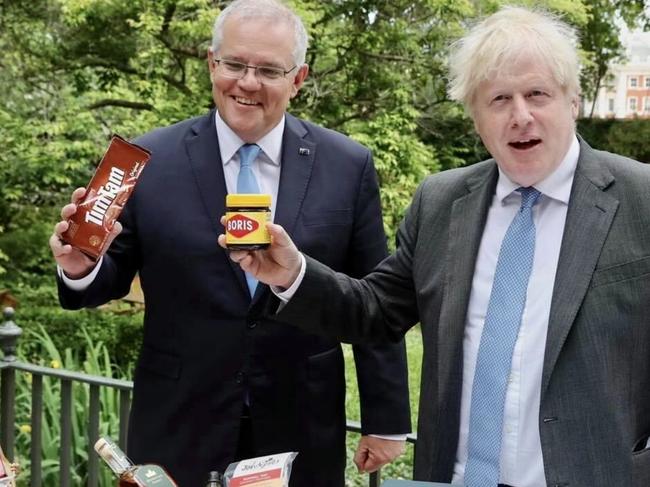Christopher Pyne: Britain needs the free-trade deal more than us
Free trade is a good thing – but Britain has agreed to a deal with Australia because it had to, not because it wanted to, writes Christopher Pyne.
Opinion
Don't miss out on the headlines from Opinion. Followed categories will be added to My News.
Be under no illusion, Britain needs a free-trade agreement (FTA) with us more than we do with them.
Having thrown Australia and New Zealand under the proverbial economic bus in the 1970s when they unceremoniously closed their market to Australian produce and embraced Europe, they now have agreed in principle to an FTA with us, not because it has been a burning passion in their collective breasts for the past 50 years, but because they had to.
Don’t get me wrong, I welcome the FTA that Scott Morrison agreed in principle to, with UK Prime Minister Boris Johnson, when he was in London last week.
Free trade is a good thing, in and of itself. The more free trade the better for Australia because we are a net exporter of as many things as we can produce – from wheat to wool and coal to uranium, as well as education and services of every persuasion.
We export rounds of cheese and parts for planes, as well as whole military vehicles.
In fact, Australia has been the global leader in promoting free trade for eons.
We need to understand, however, that Australia has just done a huge favour for Britain and not the other way around.

It is particularly good of us when you consider that they didn’t bat an eyelid when they joined the European Economic Community in the 1970s and it was Australia that had to scramble to find new markets for our products. But we did.
In fact, we did so well decoupled from the Mother Country that we broke the record for the longest period of continuous economic growth of any nation on the globe since records of such statistics were kept.
That winning streak was only broken by the coronavirus pandemic.
The only reason Britain wants an FTA with Australia is because they exited the European Union in the so-called Brexit.
Europe has now imposed similar conditions on them to all other non-European Union nations, and Britain is looking for friends.
Fortunately for them, Australia is a good friend and we are pro free trade, so it was an easy first trade win for Johnson’s government.
The actual substance of the FTA is good. Easier movement of people and goods and services between Britain and Australia, as well as the phasing out of tariffs over 15 years on our agricultural products, is inherently positive. I would note, perhaps sourly, that Britain didn’t give our farmers the same courtesy back in the 1970s that we have agreed to show to their farmers through such a long phase-in period.
Britain will now seek to extend their free-trade credentials across the globe, and it is a feather in the Australian Government’s cap that their first agreement is with us.
Trade with Britain will not irrevocably change our economy. It is small in comparison to our trade with the Indo Pacific. This point was well made by Johnson himself when he cited the fact that trade between Australia and Britain is worth $15bn, whereas between Australia and China alone it is worth $175bn.
Our major effort is, and needs to be, on maintaining and growing that trade and diversifying to other markets as much as possible, such as the United States of America, the Middle East, Japan, India and the Association of Southeast Asian Nations.
There was a certain outpouring of nostalgia from some commentators and pundits following the FTA announcement. They were largely the same people who welcomed Brexit.
Fortunately, the wind was taken out of those sails from an unlikely quarter.
One of Australia’s best-known Anglophiles, former prime minister John Howard, made the very sensible observation that the FTA is “obviously a welcome development but the gains are not huge and it needs to be kept in perspective”.
Nostalgia doesn’t pay the bills. Hard work does.
Other writers heralded the FTA as the start of a newly engaged Britain in the Indo Pacific.
Not having an FTA with Britain for the past 50 years hasn’t affected our mutual support in international affairs and national security.
Britain and Australia are as tight as almost any two countries can get, so the FTA isn’t going to make any difference to that relationship.
There was even a suggestion that Britain might now look to join the Comprehensive and Progressive Agreement for Trans-Pacific Partnership. This is the agreement on trade signed by the Turnbull government between 11 nations in the Indo Pacific.
While it includes countries as far away as Peru and Canada, it doesn’t include any nations that aren’t actually in the Indo Pacific. Nor should it.
While Britain still has interests in the Indo Pacific, it is not an Indo Pacific nation and should not be included in the TPP.
So, three cheers for the Australia-Britain free-trade agreement.
However, like a good day at the races, our take might pay for dinner but it isn’t going to pay off the mortgage.



